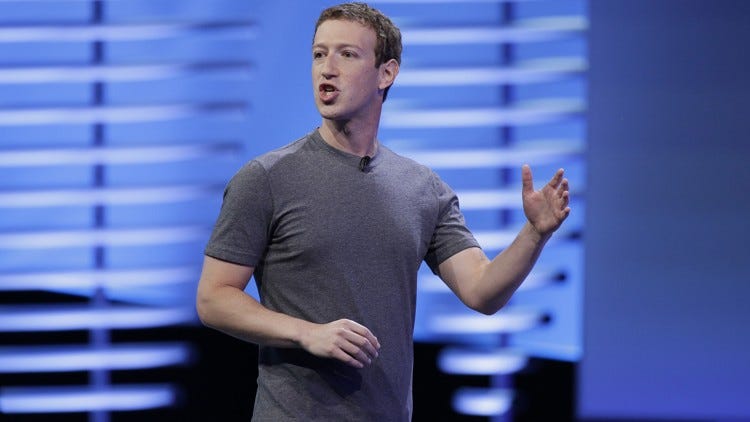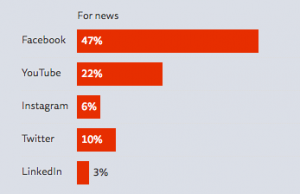
Facebook’s newsfeed changes: a disaster or an opportunity for news publishers?
Social
media and digital executives in newsrooms already have a tough job
connecting their content to consumers via social media, but Facebook’s proposed changes in the algorithms of its ‘newsfeed’
are going to make it a lot harder. Social networks offer immense
opportunities for reaching vast new audiences and increasing the
engagement of users with journalism. The most important platform in the
world is about to make that more difficult.
Clearly,
this is a blow for news publishers who have spent the last decade or so
fighting a battle for survival in a world where people’s attention and
advertising have shifted to other forms of content and away from news
media brand’s own sites. They are clearly very concerned. Yet, could this be a wake-up call that will mean the better, most adaptive news brands benefit?
I’m
not going to argue that this is good news for news publishers, but
blind panic or cynical abuse of Facebook is not a sufficient response.
The honest answer is that we don’t know exactly what the effect will be
because Facebook, as usual, have not given out the detail and different
newsrooms will be impacted differently.
It’s exactly the kind of issue we are looking at in our LSE Truth, Trust and Technology Commission.
Our first consultation workshop with journalists, and related
practitioners from sectors such as the platforms, is coming up in a few
weeks. This issue matters not just for the news business. It is also
central to the quality and accessibility of vital topical information
for the public.
Here’s my first attempt to unpack some of the issues.

Firstly,
this is not about us (journalists). Get real. Facebook is an
advertising revenue generation machine. It is a public company that has a
duty to maximise profits for its shareholders. It seeks people’s
attention so that it can sell it to advertisers. It has a sideline in
charging people to put their content on its platform, too. It is a
social network, not a news-stand. It was set up to connect ‘friends’ not
to inform people about current affairs. Journalism, even where shared
on Facebook, is a relatively small part of its traffic.
Clearly,
as Facebook has grown it has become a vital part of the global (and
local) information infrastructure. Other digital intermediaries such as
Google are vastly important, and other networks such as Twitter are
significant. And never forget that there are some big places such as
China where other similar networks dominate, not Facebook or other
western companies. But in many countries and for many demographics,
Facebook is the Internet, and the web is increasingly where people get their journalism. It’s a mixed and shifting picture but as the Reuters Digital News Report shows, Facebook is a critical source for news.

From Reuters Digital News Report 2017
If you read Zuckerberg’s statement he makes it clear that he is trying to make Facebook a more comfortable place to be:
“recently we’ve gotten feedback from our community that public content — posts from businesses, brands and media — is crowding out the personal moments that lead us to connect more with each other.”
His users are ‘telling him’ (i.e. fewer of them are spending less time on FB) what a plethora of recent studies and books
have shown which is that using Facebook can make you miserable. News
content — which is usually ‘bad’ news — doesn’t cheer people up. The
angry, aggressive and divisive comment that often accompanies news
content doesn’t help with the good vibes. And while the viral spread of
so-called ‘fake news’ proves it is popular, it also contributes to the
sense that Facebook is a place where you can’t trust the news content.
Even when it is credible, it’s often designed to alarm and disturb. Not
nice. And Facebook wants nice.
One response to this from journalists is despair and cynicism. The UK media analyst Adam Tinworth sums this approach up in a witty and pithy ‘translation’ of Zuckerberg’s statement:
“We can’t make money unless you keep telling us things about yourself that we can sell to advertisers. Please stop talking about news.”
Another
accusation is that Facebook is making these changes because of the
increasing costs it is expending at the behest of governments who are
now demanding it does more to fight misinformation and offensive
content. That might be a side-benefit for Facebook but I don’t think
it’s a key factor. It might even be a good thing for credible news if
the algorithmic changes include ways of promoting reliable content. But
overall the big picture is that journalism is being de-prioritised in
favour of fluffier stuff.
Even Jeff Jarvis, the US pioneer of digital journalism who has always sought to work with the grain of the platforms, admits that this is disturbing:
“I’m worried that news and media companies — convinced by Facebook (and in some cases by me) to put their content on Facebook or to pivot to video — will now see their fears about having the rug pulled out from under them realized and they will shrink back from taking journalism to the people where they are having their conversations because there is no money to be made there.”*
The
Facebook changes are going to be particularly tough on news
organisations that invested heavily in the ‘pivot to video’. These are
often the ‘digital native’ news brands who don’t have the spread of
outlets for their content that ‘legacy’ news organisations enjoy. The
BBC has broadcast. The Financial Times has a newspaper. These
organisations have gone ‘digital first’ but like the Economist they have
a range of social media strategies. And many of them, like the New York
Times, have built a subscription base. Email newsletters provide an
increasingly effective by-pass for journalism to avoid the social media
honey-trap. It all makes them less dependent on ‘organic’ reach through
Facebook.
But
Facebook will remain a major destination for news organisations to
reach people. News media still needs to be part of that. As the
ever-optimistic Jarvis also points out,
if these changes mean that Facebook becomes a more civil place where
people are more engaged, then journalism designed to fit in with that
culture might thrive more:
“journalism and news clearly do have a place on Facebook. Many people learn what’s going on in the world in their conversations there and on the other social platforms. So we need to look how to create conversational news. The platforms need to help us make money that way. It’s good for everybody, especially for citizens.”
News
organisations need to do more — not just because of Facebook but also
on other platforms. People are increasingly turning to closed networks
or channels such as Whatsapp. Again, it’s tough, but journalism needs to
find new ways to be on those. I’ve written huge amounts
over the last ten years urging news organisations to be more networked
and to take advantage of the extraordinary connective, communicative
power of platforms such as Facebook. There has been brilliant
innovations by newsrooms over that period to go online, to be social and
to design content to be discovered and shared through the new networks.
But this latest change shows how the media environment continues to
change in radical ways and so the journalism must also be reinvented.
Social media journalist Esra Dogramaci has written an excellent article
on some of the detailed tactics that newsrooms can use to connect their
content to users in the face of technological developments like
Facebook’s algorithmic change:
“if you focus on building a relationship with your audience and developing loyalty, it doesn’t matter what the algorithm does. Your audience will seek you out, and return to you over and over again. That’s how you ‘beat’ Facebook.”
Journalism Must Change
The
journalism must itself change. For example, it is clear that emotion is
going to be an even bigger driver of attention on Facebook after these
changes. The best journalism will continue to be factual and objective
at its core — even when it is campaigning or personal. But as I have written before,
a new kind of subjectivity can not only reach the hearts and minds of
people on places like Facebook, but it can also build trust and
understanding.
This
latest change by Facebook is dramatic, but it is a response to what
people ‘like’. There is a massive appetite for news — and not just
because of Trump or Brexit. Demand for debate and information has never
been greater or more important in people’s everyday lives. But we have
to change the nature of journalism not just the distribution and
discovery methods.
The media landscape is shifting to match people’s real media lives in our digital age. Another less noticed announcement from Facebook
last week suggested they want to create an ecosystem for local
personalised ‘news’. Facebook will use machine learning to surface news
publisher content at a local level. It’s not clear how they will vet
those publishers but clearly this is another opportunity for newsrooms
to engage. Again, dependency on Facebook is problematic, to put it
mildly, but ignoring this development is to ignore reality. The old
model of a local newspaper for a local area doesn’t effectively match
how citizens want their local news anymore.
What Facebook Must Do
Facebook
has to pay attention to the needs of journalism and as it changes its
algorithm to reduce the amount of ‘public content’ it has to work harder
at prioritising quality news content. As the Guardian’s outstanding
digital executive Chris Moran points out, there’s no indication from
Facebook that they have factored this into the latest change:

Fighting
‘fake news’ is not just about blocking the bad stuff, it is ultimately
best achieved by supporting the good content. How you do that is not a
judgement Facebook can be expected or relied upon to do by itself. It
needs to be much more transparent and collaborative with the news
industry as it rolls out these changes in its products.
When
something like Facebook gets this important to society, like any other
public utility, it becomes in the public interest to make policy to
maximise social benefits. This is why governments around the world are
considering and even enacting legislation or regulation regarding the
platforms, like Facebook. Much of this is focused on specific issues
such as the spread of extremist or false and disruptive information.

